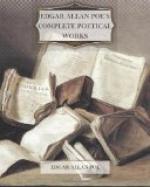Regarding, then, Beauty as my province, my next question referred to the tone of its highest manifestation—and all experience has shown that this tone is one of sadness. Beauty of whatever kind, in its supreme development, invariably excites the sensitive soul to tears. Melancholy is thus the most legitimate of all the poetical tones.
The length, the province, and the tone being thus determined, I betook myself to ordinary induction, with the view of obtaining some artistic piquancy which might serve me as a key-note in the construction of the poem—some pivot upon which the whole structure might turn. In carefully thinking over all the usual artistic effects—or more properly points, in the theatrical sense—I did not fail to perceive immediately that no one had been so universally employed as that of the refrain. The universality of its employment sufficed to assure me of its intrinsic value, and spared me the necessity of submitting it to analysis. I considered it, however, with regard to its susceptibility of improvement, and soon saw it to be in a primitive condition. As commonly used, the refrain, or burden, not only is limited to lyric verse, but depends for its impression upon the force of monotone—both in sound and thought. The pleasure is deduced solely from the sense of identity—of repetition. I resolved to diversify, and so heighten the effect, by adhering in general to the monotone of sound, while I continually varied that of thought: that is to say, I determined to produce continuously novel effects, by the variation of the application of the refrain—the refrain itself remaining, for the most part, unvaried.
These points being settled, I next bethought me of the nature of my refrain. Since its application was to be repeatedly varied, it was clear that the refrain itself must be brief, for there would have been an insurmountable difficulty in frequent variations of application in any sentence of length. In proportion to the brevity of the sentence would of course be the facility of the variation. This led me at once to a single word as the best refrain.
The question now arose as to the character of the word. Having made up my mind to a refrain, the division of the poem into stanzas was of course a corollary, the refrain forming the close to each stanza. That such a close, to have force, must be sonorous and susceptible of protracted emphasis, admitted no doubt, and these considerations inevitably led me to the long o as the most sonorous vowel in connection with r as the most producible consonant.




